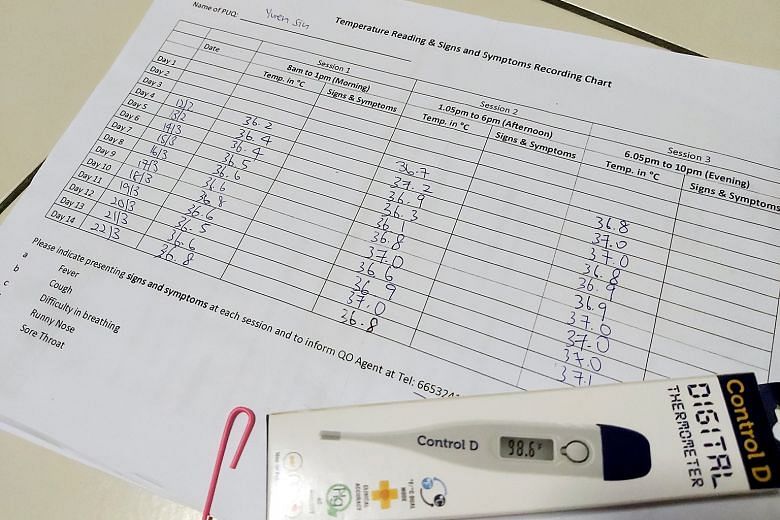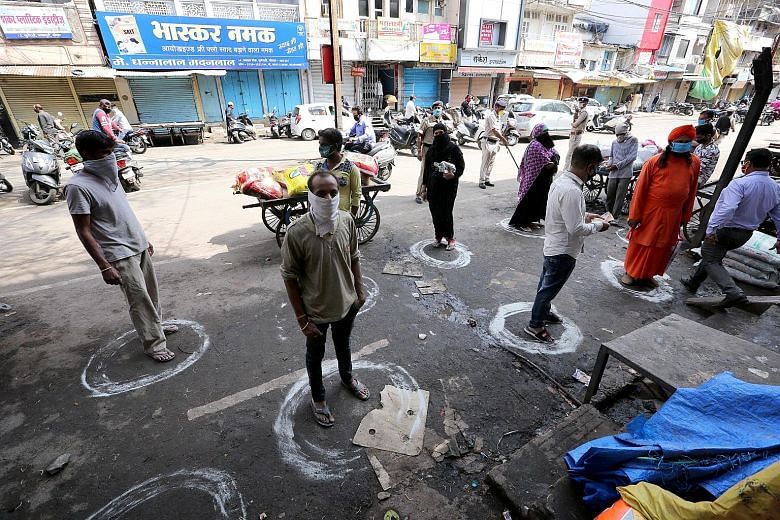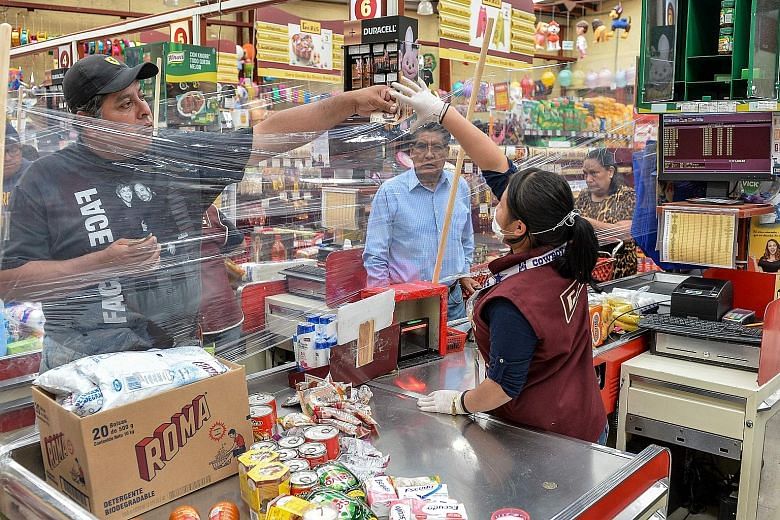An invisible bug has changed how people around the world lead their lives. Here's a special report by members of the World Editors Forum.
Telling the story of a shared global calamity

Everywhere, the world is facing one of the worst health, economic and political crises it has seen in decades. Sadly, this is a shared reality, a calamity that has hit, and unites, us all.
One-third of the world's people are now in lockdown, isolated and confined to their homes.
In Singapore, a tiny city-state in Asia where I live, usually a busy aviation and transport hub, we feel this especially keenly, as we have once again become, literally, an island.
This too shall pass, we hope

There's this moment between being asleep and awake when the world is deliciously vague.
In those few floaty seconds before my brain and body reconnect to reality, I could be anywhere in time.
Sometimes, I feel as if I'm still a child, waking up to get ready for school. Or I'm on holiday, in a hotel on a faraway beach, on a bed with starched white sheets.
Asia's darkest hour

In ordinary times, Singapore's Changi Airport - straddling Asia's crossroads and among the finest of such facilities anywhere - is a humming, throbbing hive of activity. It is to Asia what Dubai is to the Middle East and Africa, or London's Heathrow to Europe. Last week, a history buff walking into any of its terminals could be excused for musing this must have been how newly deserted towns in the Sierra Nevada seemed at the end of the California Gold Rush.
The barely active terminals are a result of the Singapore Government's decision to disallow all short-term visitors into the country as it battles Covid-19, now seeing a second surge after the island republic asked its sons and daughters overseas to come home to escape the coronavirus ravaging Europe and America. Bars and other entertainment outlets have been ordered to close; equally significant for a determinedly multicultural, multi-religious nation, mosques and churches, too.
Singapore thrives on openness; trade, for instance, is three times its gross domestic product (GDP). That it should have taken these steps even as its annual tourist numbers are more than three times its 5.7 million resident population underscores how seriously it is taking the threat.
Stranded in Wuhan, wanting to go home

Monday two weeks ago marked a month since mobile game developer Jiang Wenqiang was stranded in Wuhan, the Chinese city in Hubei province where the coronavirus outbreak was first reported.
To support himself, he worked 12 hours a day collecting rubbish and scrubbing floors at a local hospital.
It was not his plan. Mr Jiang, from China's north-east city of Dalian, had been on a train from Shanghai to the southern city of Changsha in Hunan province to sign a contract with a business partner early last month. While on the train, he left his compartment to buy lunch.
In Italy, death bells stop tolling to spare residents the anguish

On March 7, in the small Italian town of Nembro, the death bells stopped tolling. Its curate, Don Matteo Cella, tells me: "We decided not to ring them any more since that Saturday, the day of the four funerals. The whole day would have been filled with the sound of the death knell, and this would have caused untold anguish for the entire community."
Nembro, with its 11,500 residents and numerous churches, all under a single parish, is tended by five priests. Four were taken ill, only one was left standing: the youngest - the curate, 40-year-old Don Matteo.
A small village east of Bergamo in the Lombardy region, Nembro is the gateway to the Seriana Valley and where Italy's America's Cup Luna Rossa sailboat hull was built.
Being quarantined taught me not to be complacent

At the beginning of the month, the coronavirus situation in Singapore had appeared to be improving.
The number of cases reported daily was tapering off, with just a few new ones every day.
While there were reports of the outbreak escalating in countries such as South Korea and Italy, things in Singapore were generally calm, though additional measures such as temperature screening had to be observed.
Ireland's calm before the surge

About this time four weeks ago, Ireland's caretaker Prime Minister Leo Varadkar was a political lame duck.
He was the medical doctor turned politician whose bedside manner deserted him during a bruising general election campaign in which his party came in a miserable third.
All through the sodden January-February campaign, the public anger was palpable. Younger voters made it clear they wanted "change" and this proved life-threatening for Mr Varadkar's minority administration which delivered unprecedented economic growth but presided over an acute housing shortage.
Facing the fear machine in Brazil

I ordered dinner by tele-delivery. It will have to be like that, in these infectious times. No picnics, no get-togethers, no creamy beers, unless you install a barrel at home, which is not a bad idea.
But, as I was saying, I ordered dinner and the deliveryman arrived with the cardboard box in one arm and the credit card machine in the other. As I approached him, with my card in hand, I thought: This guy spends the whole day offering this machine to other people to type in their passwords.
There are dozens of index fingers a day, hundreds a week, maybe thousands a month. The chance that one of these fingers is contaminated is great, it is immense, and I, here, am about to press that filthy keyboard with my aseptic indicator, which has just been sanitised with alcohol gel.
Quarantined Kerala student never felt mentally isolated

The existence of coronavirus in India is a reality and the number of people affected by it will definitely shoot up. But so will those who recover. If one follows the world example, 81 per cent of people infected with the virus will have mild symptoms and recover soon.
In times of pandemic and panic, the story of a young medical student, among the first three cases to test positive in India, gives hope.
The 23-year-old medical student studying in Wuhan, China, the epicentre of the new outbreak, landed in Kerala on Jan 24, and the next day, he reported to the nearest public health centre. "It was my responsibility," he tells me in a phone interview from Allepey, Kerala.
Marriage, interrupted: Keeping romance alive on separate floors

Lovely to see you again, even from the distance of 6m as you walked in the front door and I stood out on the sidewalk, to maintain non-contagion. Did you have a good time in California with Patty and Judy?
I hope so, because you are not going to have a good time back here at home. Because you're returning from the United States, you have to undergo self-isolation for two weeks, on your own floor of the house and in your own bed and bathroom, while I have to practise "social distancing". I don't have any symptoms beyond a slight sore throat, but it makes sense for everyone to act as if they are infected, as there aren't enough tests. Which is why I am in our 350 sq ft basement apartment, and you are in the house itself.
I tried to leave your solitary-confinement cell pristine by disinfecting everything I have been touching regularly before I took up my lowly place in the basement: all the taps and faucets, the stairway banisters, the flush handles on the toilets, the front and back door knobs, the blind string on the window nearest the bed.
Mexico's best and worst through the eyes of journalists

The letter had the look of an official document, complete with the logo of the Mexican Institute of Social Welfare, the largest public health agency in the country. It was a status report about one of the institute's hospitals in my home town of Torreon in northern Mexico: A cluster of 34 patients had tested positive for the coronavirus.
The letter was circulating widely on social media, particularly on WhatsApp, at a moment when the city had only one confirmed case of the disease.
Because nobody believed there was really just one sick person in a city of 1.2 million people, the news of 34 cases was credible - and scary.











